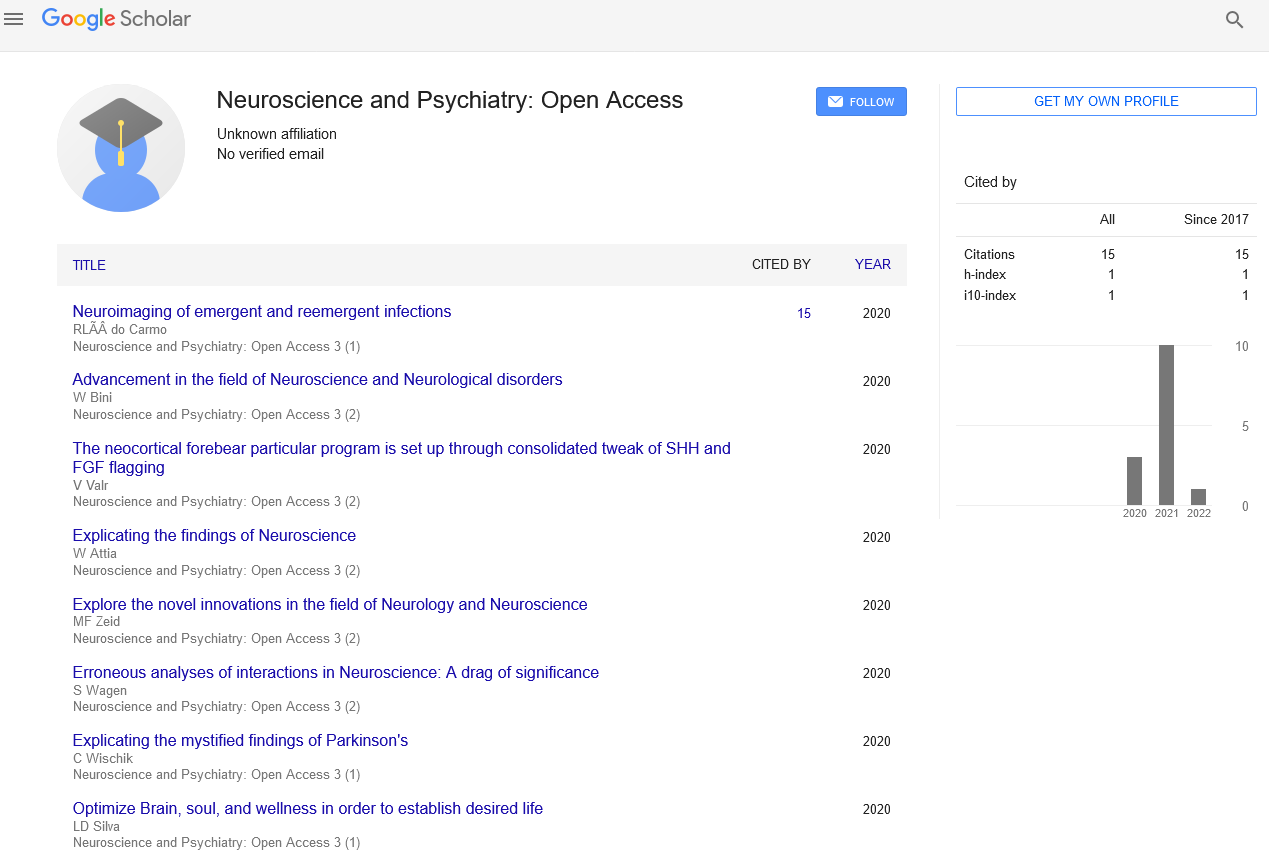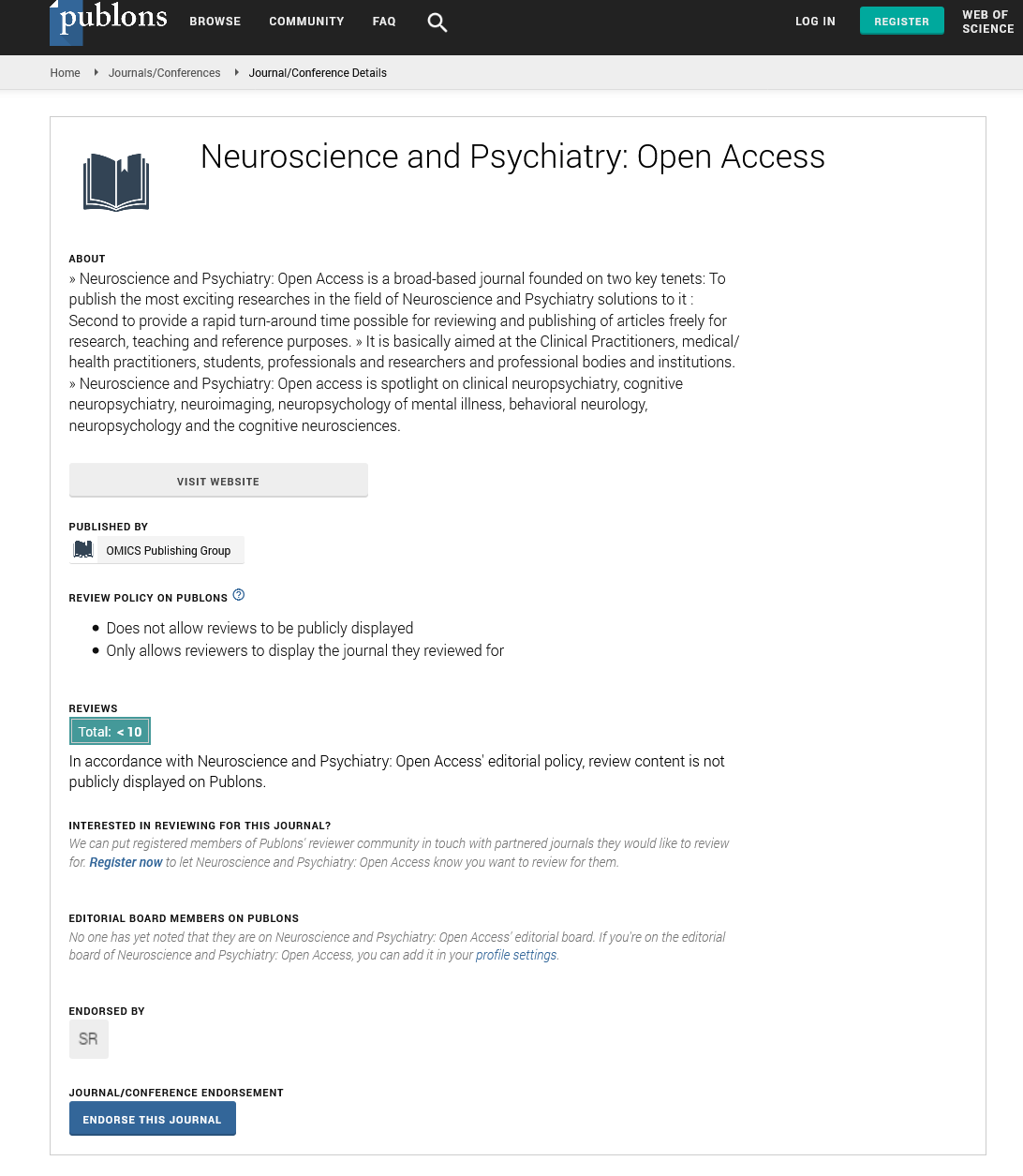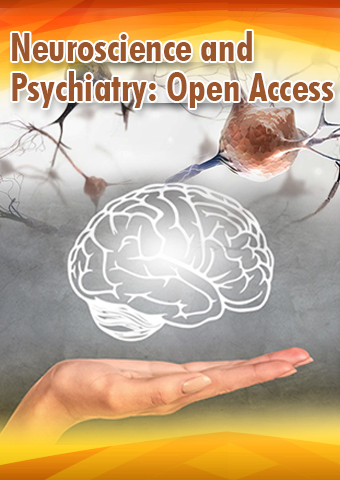Commentary - Neuroscience and Psychiatry: Open Access (2024) Volume 7, Issue 4
Neuroethics: Addressing Ethical Challenges in Neuroscience Research
- Corresponding Author:
- Matthew Meek
Department of Neuroscience, University of Washington, Washington, USA
E-mail: matthew.m@hsc.utah.edu
Received: 19-06-2024, Manuscript No. NPOA-24-140652; Editor assigned: 22-06-2024, PreQC No. NPOA-24-140652 (PQ); Reviewed: 06-07-2024, QC No. NPOA-24-140652; Revised: 17-07-2024, Manuscript No. NPOA-24-140652 (R); Published: 24-07-2024, DOI: 10.47532/npoa.2024.7(4).247-248
Introduction
Neuroscience, the study of the brain and nervous system, holds immense promise for advancing our understanding of human cognition, behavior, and neurological disorders. As research in neuroscience accelerates, ethical considerations surrounding the use of emerging technologies, ethical implications of neuroscientific findings, and societal impact become increasingly pertinent. Neuroethics, a multidisciplinary field at the intersection of neuroscience and ethics, aims to identify, analyze, and address ethical issues arising from neuroscience research, clinical applications, and public policies. This article explores key ethical challenges in neuroscience research, ethical frameworks guiding responsible conduct, and future directions in neuroethics.
Emerging technologies and ethical concerns
Advancements in neuroscience have led to the development of powerful technologies that raise ethical concerns regarding their use and implications:
Brain-Computer Interfaces (BCIs): BCIs enable direct communication between the brain and external devices, offering potential benefits for individuals with severe motor disabilities. Ethical considerations include privacy concerns, consent for invasive procedures, and implications for personal identity and autonomy.
Neuroimaging techniques: Functional MRI (fMRI) and other neuroimaging methods provide insights into brain function and connectivity. Ethical issues include privacy of neural data, potential misuse for commercial or forensic purposes, and implications for personal privacy and confidentiality.
Genomic studies: Neurogenomics investigates genetic influences on brain structure, function, and neurological disorders. Ethical challenges include privacy of genetic information, informed consent for genetic testing, and potential implications for personalized medicine and neurodevelopmental disorders.
Neuroenhancement: Cognitive enhancement technologies, such as pharmacological agents or electrical stimulation, raise ethical concerns regarding safety, fairness in access, unintended consequences on personality or identity, and societal implications of enhancing cognitive abilities.
Ethical frameworks in neuroscience research
Ethical principles and guidelines provide frameworks for responsible conduct in neuroscience research, clinical practice, and policy development:
Respect for autonomy: Informed consent ensures that individuals participating in neuroscience research understand potential risks, benefits, and implications of their involvement. Respecting autonomy involves protecting participants’ rights to self-determination and privacy.
Beneficence and nonmaleficence: Researchers and clinicians have a duty to maximize benefits and minimize harm to research participants and patients. Ethical considerations include balancing risks and benefits of interventions, ensuring safety in neuroscientific experiments, and prioritizing patient well-being in clinical applications.
Justice: Fairness and equity in neuroscience research and healthcare delivery are essential ethical principles. Addressing disparities in access to neuroscientific advancements, ensuring equitable distribution of benefits, and considering societal implications of neurotechnologies promote justice in neuroethical practice.
Integrity and transparency: Maintaining scientific integrity, honesty in reporting findings, and transparency in research conduct are fundamental to ethical neuroscience practice. Ethical challenges include conflicts of interest, responsible communication of research outcomes, and ethical review of neuroscientific publications.
Ethical challenges in neuroscientific research
Neuroscience research encounters ethical dilemmas that require careful consideration and ethical analysis:
Dual-use technologies: Neurotechnologies with dual-use potential, such as neuropharmacology or neuroimaging, raise ethical concerns about their misuse for military, forensic, or coercive purposes. Ethical frameworks emphasize responsible stewardship and ethical oversight to mitigate potential risks.
Neuroprivacy and data security: Advances in neuroimaging and neuroinformatics raise ethical concerns about the privacy, confidentiality, and security of neural data. Protecting sensitive information, ensuring data anonymization, and implementing robust data security measures are critical in neuroscientific research.
Neurodiversity and inclusivity: Ethical considerations in neuroscience research include respecting diverse neurological profiles, understanding variations in brain structure and function, and promoting inclusive research practices that consider cultural, socioeconomic, and developmental factors.
Neuroethics in global contexts: Addressing ethical challenges in global neuroscience research involves navigating cultural differences, addressing disparities in research resources and healthcare access, and promoting international collaboration to advance neuroscientific knowledge ethically.
Future directions in neuroethics
Advancing neuroethics requires interdisciplinary collaboration, stakeholder engagement, and proactive ethical governance:
Education and training: Integrating neuroethics education into neuroscience training programs equips researchers, clinicians, and policymakers with ethical reasoning skills and awareness of ethical implications in neuroscientific practice.
Ethical guidelines and policy development: Developing robust ethical guidelines, regulatory frameworks, and policy recommendations ensures responsible conduct in neuroscience research, clinical applications, and public policy decisions.
Public engagement and communication: Promoting public awareness, dialogue, and informed consent in neuroscientific research enhances transparency, trust, and ethical accountability within communities affected by neurotechnologies.
Neuroethics committees: Establishing neuroethics committees and Institutional Review Boards (IRBs) to review neuroscientific protocols, assess ethical implications, and provide guidance on responsible research conduct and clinical practice.
Neuroethics plays a pivotal role in navigating ethical challenges posed by advances in neuroscience research and technology. By integrating ethical principles, frameworks, and stakeholder perspectives, neuroethics promotes responsible innovation, ethical governance, and societal benefit in the pursuit of understanding brain function, treating neurological disorders, and enhancing human well-being. As neuroscience continues to evolve, proactive engagement with ethical issues ensures that neuroscientific advancements are ethically sound, equitable, and aligned with principles of beneficence, justice, and respect for human autonomy. Embracing neuroethics as an integral component of neuroscience research and practice fosters ethical excellence, fosters trust, and upholds ethical integrity in the pursuit of scientific discovery and clinical innovation.


